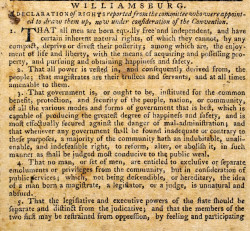What didn’t George Mason sign the Bill of Rights?
 September 12, 1787 — In early 1776, before the Declaration of Independence was written, American statesman George Mason drafted the Virginia Declaration of Rights and framed Virginia’s constitution. He was rightfully proud of the Declaration, and pleased that it became a model for other states.
September 12, 1787 — In early 1776, before the Declaration of Independence was written, American statesman George Mason drafted the Virginia Declaration of Rights and framed Virginia’s constitution. He was rightfully proud of the Declaration, and pleased that it became a model for other states.
But when he suggested the addition of a Bill of Rights to the Constitution be modeled on previous state declarations, the motion is defeated. As a result, he didn’t sign the document.
Why? Historians explain that Mason did not believe the Constitution established a wise and just government, hotly fought against it during Virginia ratification. He was one of only three delegates present in the final days of the convention who didn’t sign. (The other two were Elbridge Gerry, who was known to be cantankerous by nature, and Edmond Randolph, who was afraid to be associated with something that might fail.)
Sources
Words of Wisdom
The eyes of the United States are turned upon this assembly and their expectations raised to a very anxious degree. May God grant that we may be able to gratify them, by establishing a wise and just government.





